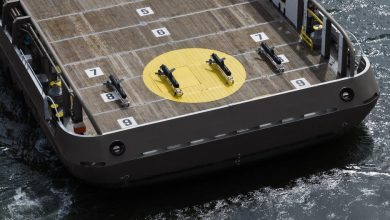Lithuania joins NATO mission to protect Baltic Sea infrastructure

Lithuania is contributing to NATO’s mission to protect critical infrastructure in the Baltic Sea but remains mum on what specific capabilities it is allocating.
“Some of our capabilities are being used in the context of national measure, and some are being used in the context of NATO measures. We cannot provide details as to what and how much Lithuania is contributing,” Defence Minister Dovilė Šakalienė told BNS.
On Tuesday, Finnish public broadcaster Yle reported that NATO will send around 10 ships to guard important underwater infrastructure in the Baltic Sea.
The ships are expected to arrive by the end of the week and will remain at sea until April. They will be positioned near energy and communications cables to deter any sabotage attempts.
Infrastructure will be reportedly protected by NATO ships already in the Baltic Sea and by ships specially deployed for this mission.
“This news is part of a process that has been ongoing for some time now, and we are aware of it and are taking part in it,” Šakalienė said.
The decision to step up NATO engagement follows several cable disruptions in the Baltic Sea in recent months.
Finland is currently conducting a criminal investigation into the oil tanker Eagle S, part of Moscow’s “shadow fleet”, which is suspected of breaking the EstLink 2 power cable between Finland and Estonia over Christmas.
The incident sparked an uproar in Europe, with NATO Secretary General Mark Rutte promising to “enhance the military presence in the Baltic Sea”.
Several other cable incidents have taken place in the Baltic Sea in recent months, including the breach in November of two communications cables – one linking Finland and Germany and the other Sweden and Lithuania.
The European Union is also stepping up its measures to protect submarine cables by speeding up the exchange of information, using new detection technologies and repair capabilities.
“We are very positive about the reactions of both the NATO secretary general and the Supreme Allied Commander Europe to the latest sabotage incidents,” Foreign Minister Kęstutis Budrys told BNS.
“We must step up patrols, especially in view of the increase in the number of such incidents. […] The fact that our response includes military means is a strong and good sign of how we are interpreting these threats,” Lithuania’s top diplomat said.
Experts and politicians say the recent incidents involving vital infrastructure are part of Russia’s hybrid war against Western countries.





